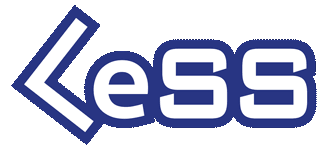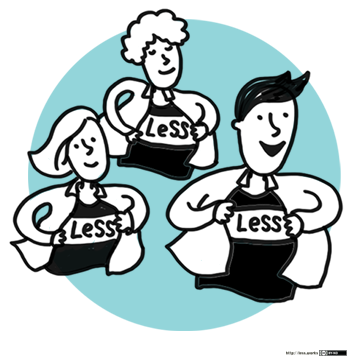Three Principles
These principles are crucial to an organizational LeSS adoption:
- deep and narrow over broad and shallow
- top-down and bottom-up
- use volunteering
Deep and Narrow over Broad and Shallow
Prefer applying LeSS in one product really well over applying LeSS in many groups poorly.
Focus LeSS adoption effort on one product group, give them all the support they need, and ensure they work really well. This minimizes risk and if you fail it triggers a focused learning opportunity. And when you succeed it creates a positive “word on the floor” that’s vital nourishment for further adoption.
Top-down and Bottom-up
Top-down or bottom-up? That’s a false dichotomy. Either one or the other by itself is likely to fail. Do both.
Purely top-down—The manager-driven, “thou shalt do LeSS”-adoption causes resistance and sets the organization up for failure. Ordering teams to manage themselves is a contradiction. LeSS adoption requires deep understanding that doesn’t come from directive but from discussion. Only by understanding, choice, and a sense of personal safety will people take the additional responsibility to reflect and improve.
Purely bottom-up—These LeSS adoptions aren’t sustainable. They create a delightful burst of energy from people who want to do the Right Thing. This leads to an open mind, accelerated learning, and deeper understanding. Really wonderful! Then these energized people energetically hit the organizational walls. Bam! Without top-level support to change structures and policies, they lose energy, and become frustrated by obstacles and rigidity.
Top-down and Bottom-up—A successful LeSS adoption needs both the energy of people doing the Right Thing and the support of people with organizational power to help them do the Right Thing. The managers’ frame of mind must be support, not control.
What kind of management support do you need?
Management support from the person(s) who has the organizational authority to make structural changes in your group—usually the head of your product group. This support must be… supporting.
Authentic support start with self-education. All managers in the product group need to take time to start learning about LeSS. This includes several days in an introductory training and several books to read. Next to education, they also need to provide clear communication and action about (1) the intention to adopt LeSS, (2) the promise to make the needed structural changes, and (3) providing education and coaching.
Use Volunteering
How to form new teams? Who will be in a community of practice? How are you going to answer these questions, and many more?
Use volunteers! True volunteering is a powerful way of engaging peoples’ minds and hearts. It’s underused, probably due to the feeling of loss of control by managers. But for people in teams it feels empowering.
Volunteering starts with education. First, provide enough education and discussion so people understand what they are volunteering for.
Here are some examples of volunteering:
- Initial-product volunteering
- Initial-teams volunteering
- Team-formation volunteering

